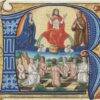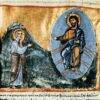Tag: Nature
The Eschatological Nature of Christian Theology
There is no reason to absolutize any period of theological history, per se. In other words, every season of theological development, within the Church’s history, is open for engagement. The Lord Himself said He would build His Church, and through Paul continued to say that He would, in particular, provide pastors and teachers, so on and so forth. This ought to teach us that Christ has been present, all along, in His Church. He hasn’t abandoned it or left it as orphans, but has provided His Holy Spirit to presence Himself and sacra doctrina among those who fellowship with Him…
Job’s Dramatic Irony: Getting God Right Through Suffering Rather than Nature
The biblical book of Job, literarily, operates with what is called dramatic irony. Here is how the Oxford Dictionary defines dramatic irony: a literary technique, originally used in Greek tragedy, by which the full significance of a character’s words or actions are clear to the audience or reader although unknown to the character.[1] As a reader, or even movie-watcher, we the audience have the capacity to read or watch with this type of ‘irony.’ We can skip to the end, and then read the beginning to the end, knowing what the final outcome is. Or we can read through a…
On the Eschatological Nature of the Theological Task
For Barth dogmatic theology is eschatological, dynamic, personal, and scandalously particular to the person and work of God in Jesus Christ. That is why the work of dogmatics is semper reformanda per the ground and grammar of God’s triune life in Jesus Christ. The work of dogmatic theology is a Petrine ‘growing in the grace and knowledge of Jesus Christ’ in ‘whom are hidden all the treasures of wisdom and knowledge.’ This implies that dogmatic theology should never be stifled by static reception or repristination. As Christians, theologians, we aren’t engaged in an impersonal arid work of dialectical analysis, per…
Pure Nature
Pure nature, I’ve referred to it before at the blog. In my view it represents all forms of ill-formed theological efforts in the history of theological efforts. There are attempts in something like the ‘mediating’ theology of the Novuelle Theologiae of someone like Henri de Lubac, wherein the hard edges of a Tridentine (and scholastic Reformed) development of pure nature are softened, but I believe the whole apparatus must be abandoned in favor of a genuinely Christ conditioned, and thus, Grace actualized notion of a God-world relation. But you might still be wondering what a natura pura (pure nature) entails….
Without Grace Nature Cannot Be Perfect: Thoughts on an Irenaean Thomist Distinction
Helmut Thielicke offers an important anthropological distinction, one that stems early on from someone as astute as Irenaeus, and then becomes appropriated and modified by someone as seismic, in the Latin church, as Thomas Aquinas. If this is not understood as a basic theological-anthropological datum vis-à-vis some form of classical theism, engaging with the theological past into the present will become immediately unintelligible—which I would suggest is why so much of popular apologetics and theologics that we see pervasive, particularly in the online theological world, ends up being an exercise in futility. I digress. Let’s hear from Thielicke on this all-important…




